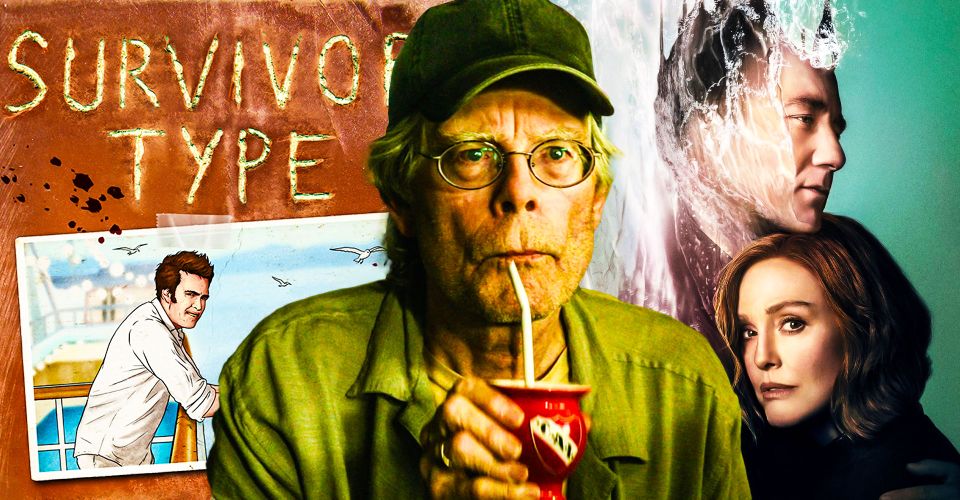Why One Of Stephen King’s Favorite Stories Has No Full-Length Adaptation

Horror icon Stephen King recently told Stephen Colbert that “Survivor Type” is among one of his personal favorite stories of his own work, so why does the short story not have a feature-length adaptation unlike the rest of his top-rated efforts? King has had a long and illustrious career in the world of horror. Many of the bestselling author’s novels have been brought to life on both the big and small screen, although not every adaptation has been greeted with critical acclaim.
For every impressive King adaptation like 2017’s IT, there is a critically maligned dud like 1984’s Children of the Corn. Despite this, King’s work remains a popular source of inspiration for horror authors and filmmakers, which makes it surprising to hear one of the writer’s favorites of his own stories has never received a movie. According to a recent interview on The Late Show With Stephen Colbert, King’s favorites of his own tales are Misery, Lisey’s Story, The Stand, “The Body” (adapted as Stand By Me), “Survivor Type” and, of course, his latest novel.
Looking through that list, one title will likely stand out for followers of the author. Misery and Stand By Me both received acclaimed Rob Reiner-directed adaptations in the ‘80s while Lisey’s Story recently became an underrated AppleTV miniseries. With a well-received ‘90s miniseries adaptation and a widely disliked 2020 remake, The Stand has a less impressive screen history but the doorstopper has nonetheless made it to the screen twice. However, although the short story was recently adapted into a brief animated segment for Shudder’s Creepshow Halloween special, “Survivor Type” has never received a film adaptation unlike the rest of the list. Anyone familiar with the subject matter can likely discern why, but for those who don’t know, it’s worth looking into one of King’s favorite—and darkest—tales.
Survivor Type Explained

Despite not featuring any conventional monster, serial killer, or supernatural elements, “Survivor Type” has the notable distinction of being one of King’s stories that the author admits “went too far” for his tastes. Featured in the short story collection Skeleton Crew, “Survivor Type” is a gruesome tale that sees a drug smuggling doctor crash land on a desert island and slowly starving as he recounts how he ended up there. Despite the harshness of that premise, it is a blackly funny story and the doctor’s karmic pile-on is bleakly humorous at times, but the ending (in which the unhinged hero begins to self-cannibalize) made even King himself cringe. The conceit of the tale is that the doctor is transcribing his last thoughts in case he is ever discovered or saved, a prospect that seems extremely unlikely when the last page leaves him muttering about his fingers “look like butterfingers,” thanks to his starvation.
Why There Is No Survivor Type Movie

Although many movies have been adapted from Stephen King’s short stories, the subject matter of “Survivor Type” would undoubtedly turn off mainstream audiences, as the lead is both morally murky and gradually less easy to understand as the story progresses. His gruesome ordeal is depicted in unflinching terms and he is a hard character to root for, making any film version a hard sell. This is doubly true when even King himself found the story a touch too intense, since a lot of the writer’s more outre flourishes (like IT’s infamous sewer scene) already need to be removed from adaptations of his work to avoid alienating viewers.
The Real Reason There Is No Survivor Type Movie

Outside of the obvious intensity of the subject matter, there is another, less-cited reason “Survivor Type” has never received the big-screen treatment. After all, King adaptations like IT Chapter 2 have not flinched away from depicting harsh content, but they are adaptations of visually spectacular, dramatic stories. In practical terms, “Survivor Type” is one of King’s less cinematic efforts, and relies much more on the internal monologue of its narrator than impressive visuals. In “Survivor Type”, the only character onscreen for most of the action is the narrator, and the gradual realization that he needs to resort to self-cannibalization is compelling in text form but would be likely drag onscreen as he has no co-stars to play off (save for an unfortunate, short-lived bird).
Viewers generally want the villains of even the goriest horror tales to be tangible threats rather than existential ones. The Haunting of Bly Manor creator Mike Flanagan’s adaptation of King’s superficially similar Gerald’s Game, for example, features a deformed serial killer who haunts the heroine so her predicament (being chained to a bed in the middle of nowhere after her husband dies) is not an entirely internal one. Without such a subplot, a movie of “Survivor Type” could easily end up feeling like The Shallows without the shark or worse, Cast Away with none of the inspirational elements.
Survivor Type’s Official (And Unofficial) Adaptations

The Creepshow Halloween special made an admirable stab at bringing the story to life, trimming the gore somewhat and relying on animation to make the story less stomach-churning. The special’s trump card was casting the ideal antihero in Kiefer Sutherland, who brings the narrator’s predicament to life with the same gruff intensity he gave Ace Merrill decades earlier. Before that, “Survivor Type” received an unofficial spoof adaptation in a Treehouse of Horror segment on The Simpsons, wherein Homer starts self-cannibalizing after being left at home without groceries.
Bizarre as it seems, both the official and unofficial adaptations of “Survivor Type” share creative DNA. Both use the medium of animation to render the grossest moments of the source palatable and both mine dark humor from their protagonist’s predicament – although the jokes are admittedly a lot broader in the Simpsons segment. Once Homer turns down broccoli in favor of fricasseeing himself, the silliness makes it a very different prospect from the original horror story, although the sequence did still earn the ire of some commentators who complained its content was too gruesome even in cartoon form. It may not reach the heights of earlier Simpsons Treehouse of Horror segments, but it is nonetheless an impressive achievement that the long-running series managed to do justice to both the humor and gross-out elements of one of King’s favorite stories.
About The Author


















